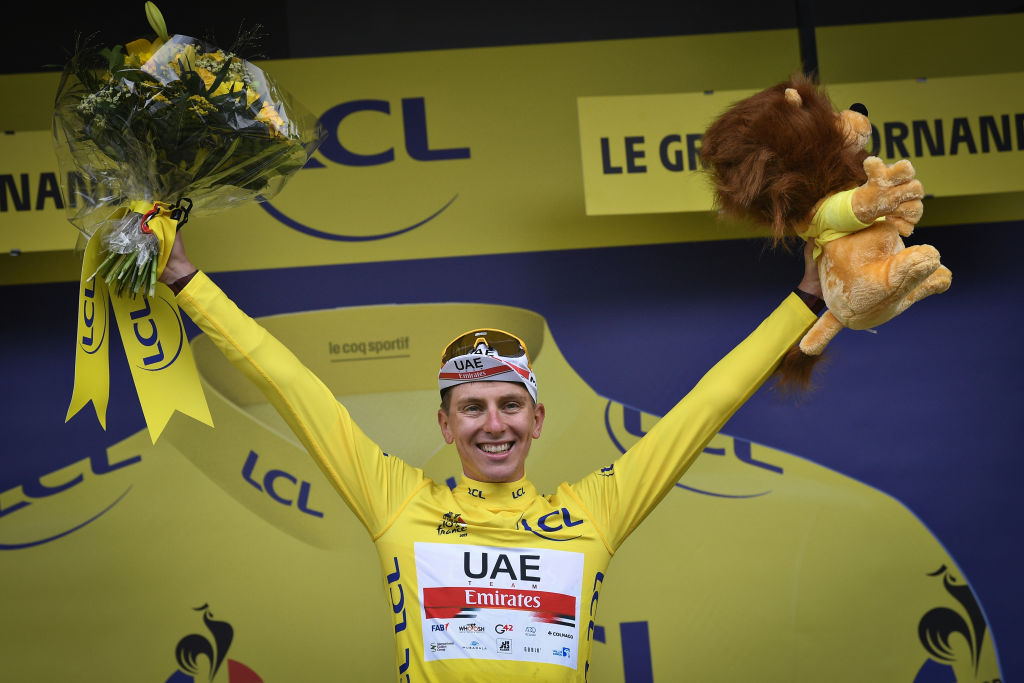Tadej Pogacar: I haven't killed the Tour de France, there's still a long way to go
Slovenian in a race of his own after solo raid on the Col de Romme

Paris is still 13 stages and over 2,000 kilometres away, but it's hard to avoid the feeling that the Tour de France is already long over as a contest.
UAE Team Emirates' Tadej Pogačar wasn't simply in a race of his own after he attacked on the Col de Romme to move into the yellow jersey on stage 8. At times it looked as though he was competing in a sport of his own to boot.
The Slovenian snatched the crown at the last from his fellow countryman, Jumbo-Visma's Primož Roglič last September, but the coronation ceremony looks set to be a rather more drawn-out affair this time around. On a grey and sodden day in the Alps, Pogačar attacked alone 4km from the top of the Col de Romme and then soloed through the remnants of the day's early break on the following Col de la Colombière.
He didn't quite make it across to the stage winner Dylan Teuns (Bahrain Victorious) there, and he eventually had to settle for fourth place at Le Grand-Bornand, but in the overall standings, Pogačar is a long way out in front.
Wout van Aert (Jumbo-Visma), second overall at 1:48, is the only rider within four-and-a-half minutes. The only man to put up even temporary resistance to Pogačar's onslaught on the Romme, Richard Carapaz (Ineos Grenadiers), is already 5:01 back. Time gaps from another era.
"I haven't killed the Tour, there's still a long way to go," Pogačar said in Le Grand-Bornand on Saturday. "Anything can happen. Today I got a gap, maybe tomorrow someone else will. It's never finished.
"We will defend 100 per cent the place we are in now, we are really confident and motivated for the next two weeks, but I did not kill the Tour, sorry."
Get The Leadout Newsletter
The latest race content, interviews, features, reviews and expert buying guides, direct to your inbox!
Miguel Indurain used to say something similar at this juncture of the Tours of the early 1990s, when he developed the habit of putting the race beyond the wildest imaginations of even his most optimistic challengers in the opening time trial.
The Spaniard at least had the decorum – or perhaps the diplomatic instincts – never to humiliate his opponents, managing his lead thereafter and doling out stage wins to allies of circumstance in exchange for friendship later on.
Pogačar shows few obvious signs of being as benign a dictator. His default setting appears to be Merckx at Mourenx rather than Miguelon at Mende. One imagines the beatings will continue until morale improves.
"Attacking is the best form of defence, no? It went really, really well," said Pogačar, who confessed that his aggression had been inspired in part by the vague sense that his rivals had conspired against him on Friday's minor epic to Le Creusot, declining to help UAE Team Emirates control the race after Van Aert and Mathieu van der Poel joined the early break.
"Maybe it was a little payback for yesterday," Pogačar said. "I don't know if every mountain stage I'll be attacking. Probably not, because this first week was really demanding now, and tomorrow we have a super hard stage already. That can change something. We will do our best and try to ride defensive from now on."
Riding the Colombière in the big ring
When this Tour set out from Brest a week ago, Roglič looked the man most likely to threaten Pogačar's supremacy, but his challenged was frayed by a crash on stage 3 and then unravelled on the road to Le Creusot on Friday. The Slovenian shipped another 35 minutes after being dropped during the relentless opening to Saturday's stage, as did Geraint Thomas (Ineos Grenadiers), another man struggling with injuries sustained in the opening week.
If circumstances did for two of Pogačar's most touted rivals, then his own raw strength saw off the rest. After the frantic start to stage 8, UAE Team Emirates began to increase the pressure in the reduced peloton on the Col de Romme. Davide Formolo took up the reins there before Pogačar unleashed his ferocious attack with 32km remaining.
"On the first of the three last climbs [the Côte de Mont-Saxonnex – ed] I saw that the Ineos riders didn't feel the best. I saw them, how they talked to each other," Pogačar said.
"And I said, 'Let's try to keep the pressure on them.' On the second last climb let's just try to break it. In the end it worked and I just paced myself to the finish."
Carapaz defiantly tracked Pogačar's first acceleration, but he eventually wilted under the weight of his forcing. Perhaps he was demoralised, too, by the visual impression of Pogačar riding in the big ring even as the gradient tilted towards 14%.
The 22-year-old continued to do so for much of the way up the Col de la Colombière for good measure, where he blew past riders of the calibre of Guillaume Martin, Simon Yates and Wout Poels without so much as a glance.
"We knew it from last year's Dauphiné," Pogačar said vaguely when asked about his gearing choice on the final climb.
By the finish in Le Grand-Bornand, Pogačar would put 3:20 into a chasing group containing riders like Carapaz, Rigoberto Urán, Enric Mas and Wilco Kelderman. They know the Tour is still long. That's the problem.

Barry Ryan was Head of Features at Cyclingnews. He has covered professional cycling since 2010, reporting from the Tour de France, Giro d’Italia and events from Argentina to Japan. His writing has appeared in The Independent, Procycling and Cycling Plus. He is the author of The Ascent: Sean Kelly, Stephen Roche and the Rise of Irish Cycling’s Golden Generation, published by Gill Books.